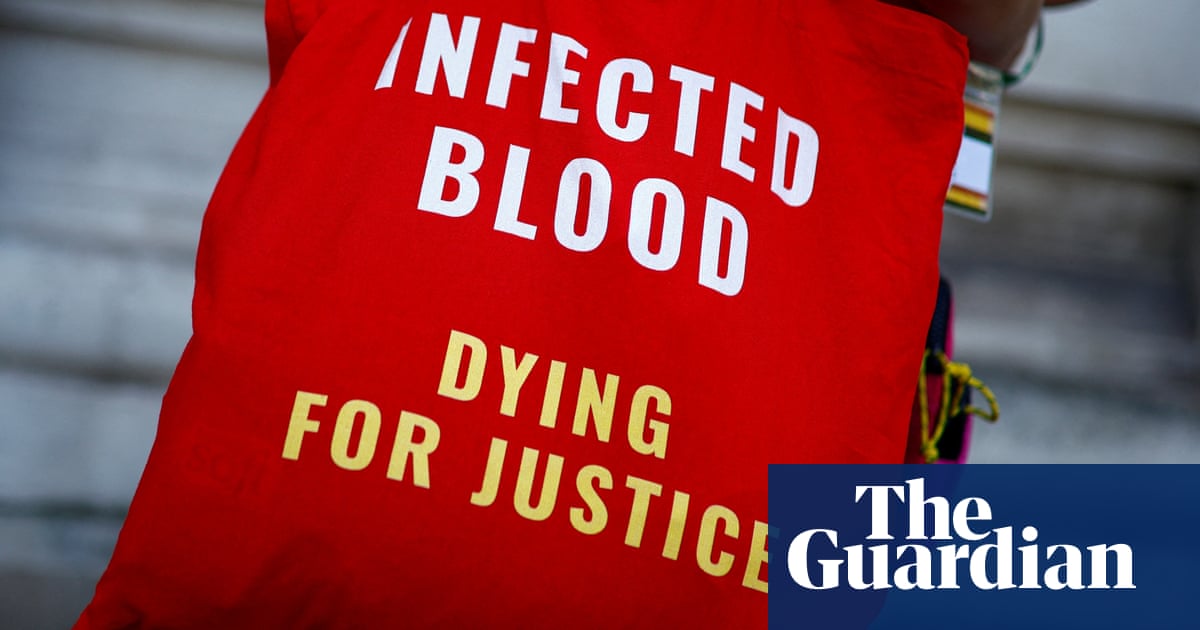People infected as a result of thecontaminated blood scandal, and their relatives, say they have been “re-traumatised” by delays to – and flaws in – the compensation scheme.
At a special hearing of the infected blood inquiry, whichpublished its final report in May last year, victims and campaigners lined up to castigate the government’s handling of compensation.
Only 106 people have received payments from the Infected Blood Compensation Authority (IBCA), with a further 54 having received offers.
As well as delays, the inquiry chair, Sir Brian Langstaff, heard complaints about qualifying criteria being too narrow, tariffs being set too low and the complexity of the claims process.
More than 3,000 people have already died after 30,000 were given contaminated blood products or transfusions from the 1970s to the early 1990s. Campaigners warned many more risk dying without justice.
Carolyn Challis was infected with hepatitis C during chemotherapy treatment, but because it occurred after screening of blood began in 1991 she has been denied compensation so far.
“We feel gaslit, marginalised and abused by successive governments that purport to care [but] evidently do not,” she told Wednesday’s hearing. “We’re suffering from sustained trauma. We should not still be fighting. We’ve been re-traumatised again and again … by the state that infected us.”
Among other issues, witnesses complained that people have to wait to be invited to apply for compensation.
Alan Burgess, from The Birchgrove Group, a support group set up by haemophiliacs with HIV, said: “It’s almost like you’re waiting for your lottery ticket to come up. And when it doesn’t come up each month, you go down and you have to drag yourself up and then you get frightened, because you might not live long enough to see this compensation come through. I’m 67 now and what they’re doing with our mental health is extraordinary.”
Like others who gave evidence, Burgess complained that, in meetings with the Cabinet Office, officials “talked down to us” rather than listening. Kate Burt, chief executive of the Haemophilia Society, called the £11.8bn compensation scheme,announcedthe day after publication of the inquiry’s final report, “an exercise in political manipulation”.
Andrew Evans, of the Tainted Blood campaign group, said: “The full acceptance of responsibility followed by promises of quick justice has turned into defensiveness and stonewalling, leaving victims feeling betrayed and disappointed. We were told that we were due comprehensive compensation with the promise that ‘whatever it costs to deliver the scheme we will pay it’.
Sign up toFirst Edition
Our morning email breaks down the key stories of the day, telling you what’s happening and why it matters
after newsletter promotion
“People report that they have fallen ill watching that promise disappear … It’s a long-held feeling that governments wish to drag this scandal out in order that the longer it goes on, the more people die and the less compensation will need to be paid.”
Confronted with victims’ and campaigners’ unhappiness with the scheme, the paymaster general, Nick Thomas-Symonds, told Wednesday’s hearing: “What I wouldn’t wish to do is make changes that cause further undue delay. But I certainly see the role now as doing our very best to push forward IBCA’s speed of payments, while respecting it because of operational independence.”
Opening the hearing, Langstaff said it was taking place “amid letter after letter, email after email, call after call expressing worries and concerns about how compensation is being delivered”. He said the inquiry would do everything in its power to “improve the delivery of compensation and to ensure that justice is done”.
